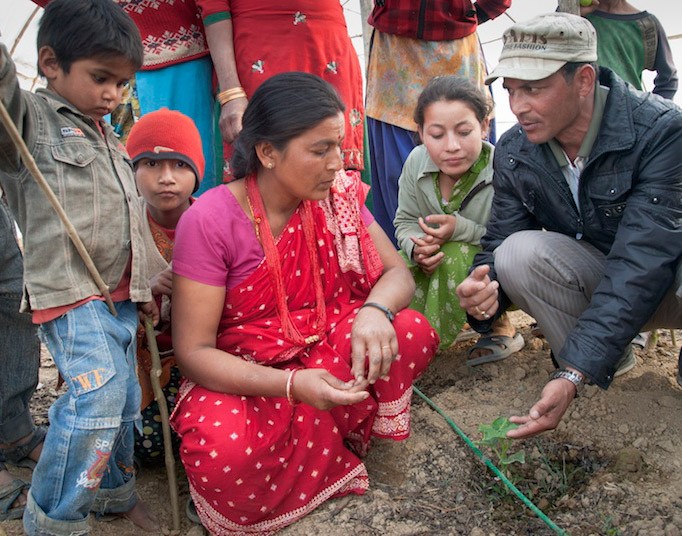
Improving Efficiency with Multiple-Use Systems in Nepal
Rina Chaudhury of the rural Dang district in Nepal’s Mid-Western region has risen from the ashes of modern-day slavery to become a self-sufficient, empowered farmer. Rina was sold into forced labor as a little girl through Nepal’s notorious Kamalari indentured servant system. When she was finally freed, she was able to marry but had no skills to earn money. “I have always had to depend on my husband for money. Who else could I turn to?” she said. But now, thanks to help from USAID/ Nepal’s Education for Income Generation project (EIG), which increased water efficiency and taught marginalized people in Nepal’s Mid-Western region the skills to thrive, Rina is the proud owner of a booming vegetable business.
People in the Mid-Western Region, where poverty is rampant, face a number of challenges. Lack of physical infrastructure makes service delivery difficult and farmers often do not have key inputs such as water. Over three-quarters lack access to improved sanitation. Consequently, over 10 percent of deaths of children under 5 are due to diarrhea.
At the heart of these problems is water – water for sanitation, water for growing food, and clean water for drinking. To simultaneously address these competing needs, EIG introduced multiple-use systems (MUS), a concept that USAID is increasingly employing around the world. MUS employs a multi-faceted approach that can meet domestic, agricultural, and sanitation demands, so water resources are efficiently and safely utilized.
Dr. Mary Renwick, who leads the MUS portfolio for EIG’s implementing partner Winrock International, said that with traditional single-use systems, “Irrigation canals may be used for bathing or people may water their livestock at a drinking water well.” This can lead to contaminated drinking water, inefficient use, and conflicts over water. “MUS is a way of avoiding those scenarios by strategically planning for people’s domestic and productive water needs, with the overarching goal of improving health and livelihoods sustainably,” Dr. Renwick said.
The new community water systems in Nepal consist of a single source pipe with dual storage and distribution systems for domestic use and for irrigation using drip and micro-sprinklers. The systems cost $100- $150 per household and are funded with investments from public and private sector sources within each community. They are particularly life changing for women, who are typically responsible for collecting water in Nepal. As a result of EIG’s relatively small investments in MUS, women who once devoted vast amounts of time and energy to fetching water can channel those efforts into expanding their farms and growing high-value vegetables.
To ensure sustainability, EIG trained young people to manage the water systems and facilitated the formation of water user groups to ensure the community could maintain the systems. In addition, the project trained 74,000 people on literacy, hygiene, nutrition, agricultural productivity, and other life skills. The benefits of these trainings have reverberated as EIG alumnae have launched their own businesses and created jobs for their countrymen and women.
“The impact of the program on household well-being has been enormous,” said Anita Mahat, an economic specialist for USAID/ Nepal. “It addressed education, health, and food security. The empowerment of women was visible. These are sustainable impacts.”
Though EIG ended in March 2013, the work will continue under two new projects that are part of the U.S. Feed the Future Initiative. The first, the Knowledge-based Integrated Sustainable Agriculture project, or KISAN (“farmer” in Nepali), is already underway, aiming to improve agriculture production, nutrition, and hygiene throughout Nepal, with an emphasis on women and children under 5 years old. And the second, an entrepreneurial literacy project, will continue and expand upon some of the training successes of EIG, targeting KISAN beneficiaries.
Outside Nepal, Winrock is applying the lessons of EIG to expand MUS around the world. “We’re consciously working on building linkages between South Asia, West Africa, and East Africa through cross-learning, joint training, and research to facilitate acceleration of MUS scale-up,” said Ms. Renwick.
Meanwhile, the thousands reached by EIG continue to benefit from the increased access to water for all of their needs and the skills that have given them new earning power. Due to these interventions, more than 54,000 people working in agriculture, 82 percent of whom are women, have increased their incomes by an average of 250 percent.
Rina is one of these women, and her ambitions continue to soar. “Today, with my EIG education, I am determined to grow my agricultural business,” she said. “My self-confidence is higher now.”
K. Unger Baillie







Comment
Make a general inquiry or suggest an improvement.